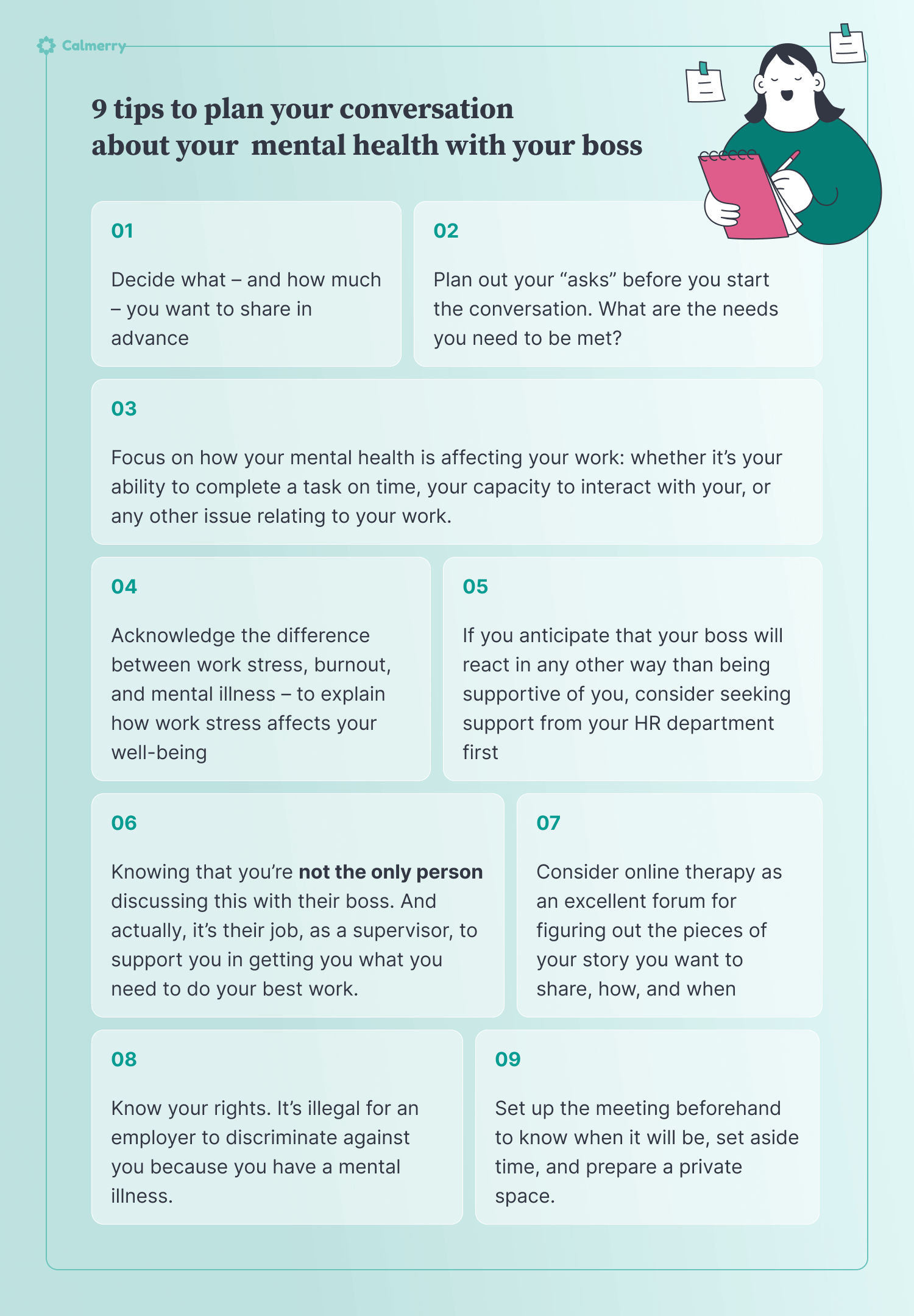How to Talk to Your Boss About Your Mental Health

In this article
If you’re struggling to manage your mental illness with your work responsibilities, you are not alone. More than 20% of US adults, including countless celebrities, experience a mental health challenge each year. [1] Mental illness. (n.d.). National Institute of Mental Health (NIMH). https://www.nimh.nih.gov/health/statistics/mental-illness [2] Calhoun, A., & Gold, J. A. (2020). “I Feel Like I Know Them”: the Positive Effect of Celebrity Self-disclosure of Mental Illness. Academic Psychiatry, 44(2), 237–241. https://doi.org/10.1007/s40596-020-01200-5
In addition, it costs employers hundreds of billions of dollars annually and is a major public health issue. [3] Mitchell, R., & Bates, P. J. J. (2011). Measuring Health-Related productivity loss. Population Health Management, 14(2), 93–98. https://doi.org/10.1089/pop.2010.0014 Serious mental illness is one of the leading causes of cardiovascular disease and premature death. [4] Ilyas, A., Chesney, E., & Patel, R. (2017). Improving life expectancy in people with serious mental illness: should we place more emphasis on primary prevention?. The British journal of psychiatry : the journal of mental science, 211(4), 194–197. https://doi.org/10.1192/bjp.bp.117.203240
Yet, it’s still not a common topic in the workplace. It’s hard to be vulnerable and open up to people you don’t feel particularly close with.
And when it comes to mental illness, there continues to be stigma and a tremendous amount of misunderstanding. Self-disclosure can lead to discrimination, labeling, and alienation.
You might fear that it would harm your career to bring your mental health condition to your boss’s attention.
On the flip side, sharing your story and experience can also be therapeutic. It encourages you to reflect on your journey and recognize how you’ve overcome serious challenges in the past.
It can also help you gain self-acceptance and confidence while connecting to the resources and support you need – and deserve.
Why talking about mental health with your boss is so hard?
First things first, reporting your mental illness, mental health struggle, or need for accommodation at work is no different from talking to your boss about a physical health issue.
But then, why is it so hard?
Shame has a tendency to intertwine with mental illnesses like depression, which often leads us to hide our struggles as much as we can. And the thing with many mental illnesses is that you can’t often see them.
Imagine you’re in a work meeting with 10 colleagues. Following the known prevalence, it’s likely that at least one other person who is present has a mental health condition.
Can you guess who it is? Maybe. But can you know for sure unless they’ve told you? No.
The onus is, therefore, on the individual to reveal their mental illness or mask it. And rather than reveal something vulnerable and private, many people are inclined to put on a facade and pretend that everything’s OK.
– Kate Dubé, Licensed Clinical Social Worker (LCSW)
The problem is that they are not afforded the accommodations they need and deserve to live a healthy life, grow their careers, and thrive.
9 tips to plan your conversation about your mental health
When it comes to your workplace, hiding your mental illness from your boss has the potential to harm you more than it will protect you. If they don’t understand why your performance or quality of work has changed, that’s when they’ll have grounds to be upset.
But it’s actually illegal for an employer to discriminate against you because you have a mental illness. They can’t fire you, pass you over for a promotion, or force you to take a leave. [5] Depression, PTSD, & other mental health conditions in the workplace: your legal rights. (2016, December 12). US EEOC. https://www.eeoc.gov/laws/guidance/depression-ptsd-other-mental-health-conditions-workplace-your-legal-rights
This doesn’t mean you have to tell them every detail or even discuss it with more than just your direct manager or HR representative. In fact, it’s completely acceptable and recommended to only share what you’re comfortable with and leave the rest out.
There are only 4 circumstances in which an employer is allowed to ask questions about your mental or physical health:
- Before employment begins, as long as it is a question everyone is asked
- When you plan to ask for a reasonable accommodation
- If the employer is offering affirmative action for people with disabilities and gives you the choice to answer or not
- If they are investigating a potential safety risk
Below are 9 tips to consider when thinking about discussing your mental health with your boss.

1. Decide what you want to share in advance
A friend recently asked me, “Is it OK to reveal my anxiety and depression to my boss?“
I let her know that, like the rest of the details, it’s completely up to her whether or not she wants to share her specific diagnosis with her boss or if she’d rather keep it between her and her mental health provider.
When you’re deciding how much you want to share, consider your relationship with your boss.
- How well do you know them?
- Is this a person you trust and feel comfortable talking to?
- Do you have a good working relationship?
It’s also important to think about what will feel good to you. Having to cover up your mental illness can feel stressful and lonely. Are there parts of your story that will feel like a relief to get off your chest with your colleagues or supervisor?
Before saying anything, be sure that what you plan to share is appropriate for a professional setting. Keep the other details for your friends, family, and therapist.
2. Focus on how it’s impacting your work
When you’re thinking about what to say, focus on how your mental health is affecting your work. Whether it’s your ability to complete a task on time, your need to take something off your plate, your capacity to interact with your colleagues, or any other issue relating to your work.
Don’t forget to also point out your strengths – whether it’s something that recently went well, your long-term commitment, your capacity to learn new tasks, or the way that you’re a team player.
If you’re the type of person to overshare when you’re nervous or think you’ll say more than is needed or helpful, consider making an outline of your points that you can stick to.
The more clear, concise, and professional you are, the more effective your communication will be. And the better chance you’ll walk away from the conversation feeling good about it and getting the support you need.
– Kate Dubé, Licensed Clinical Social Worker (LCSW)
Remember that whatever you do choose to communicate, once you put it out there, you can’t take it back.
3. Plan out your “asks” before you start the conversation
While you certainly don’t need to disclose more details than you’re comfortable with, and you can change your mind on the fly if the conversation goes differently than expected, to communicate effectively, you do need to have your “asks” prepared.
Consider why you are bringing this to your boss’s attention in the first place. In your dream scenario, what is it that you want?
Whether it’s to reduce your hours, have more work-from-home days, get time off for appointments, change to a flexible schedule, or something else, think about this in advance since this is really the meat of your discussion.
You may also want to check in about whether your employer offers any mental health support or an Employee Assistance Program (EAP) with a free number of therapy sessions.
Also, keep in mind that the odd day off is not sufficient to address a chronic mental health condition like OCD, an eating disorder, depression, or anxiety. If you have a mental illness, ideally, you’ll be able to get ongoing support.
Don’t hesitate to ask for a follow-up conversation to ensure your needs are met, and no further questions or issues have arisen.
4. Acknowledge the difference between work stress, burnout, and mental illness
We spend around one-third of our lives at work, not counting our commuting time. [6] One third of your life is spent at work. (n.d.). Gettysburg College. https://www.gettysburg.edu/news/stories?id=79db7b34-630c-4f49-ad32-4ab9ea48e72b With such a huge proportion of time working, it’s no surprise that nearly everyone will have an experience of work stress, exhaustion, and burnout.
While not the same as a mental illness, this overwhelm or sense of depletion can be debilitating. In fact, work-related stress can cause poor productivity, decreased performance, and even physical illness.
It also leaves you susceptible to mental health issues. [7] Houtman, I. L. D., & Kompier, M. A. J. (1995). Risk factors and occupational risk groups for work stress in the Netherlands. In S. L. Sauter & L. R. Murphy (Eds.), Organizational risk factors for job stress (pp. 209–225). American Psychological Association. https://doi.org/10.1037/10173-013
Once you know how to talk to your boss about work stress, you can differentiate that from your mental health issue and explain how the stress actually exacerbates a deeper and more persistent issue.
5. Pick the right time
If your boss has a big deadline looming, and it can wait, set up a meeting after it has passed so that work stress and anxiety don’t invade the conversation.
If you can, it’s helpful to set up the meeting in advance so that you know when it will be, that you have the time set aside, and the extra push to make it happen.
When planning the meeting, think about what time of day is generally better for you. Are you foggy-headed early in the morning, or do you hit an afternoon slump? If so, avoid those times.
On the day of, find a quiet and private space where the two of you can talk without interruption or an unwanted audience. If you’re meeting virtually, make sure to do a video call to see each other’s faces.
6. Know your rights
Before entering into a discussion about your mental health at work, know the regulations at your workplace concerning mental health. If you do not feel it is a supportive environment, you may decide to skip the conversation altogether and apply for family medical leave instead.
When you know the laws and are familiar with your rights, you can better advocate for yourself.
As a start, companies that employ at least 15 people are subject to the Americans with Disabilities Act (ADA), meaning you are entitled to reasonable accommodations.
Carefully document each interaction, including who you spoke with, when, and what you agreed to.
7. Consider talking to HR first
If you anticipate that your boss will react in any other way than being supportive of you, consider seeking additional support from your HR department – who are generally obliged by law to protect your private health information.
In some ways, it might feel more comfortable to speak with your boss, who is a familiar face. But in others, it might be a better option to speak to an HR representative first because they’re at a little more distance, and you will not need to continue working with them on a day-to-day basis.
HR will also have more information about your mental health benefits, including whether there is an employee assistance program (EAP) that can provide access to therapy sessions.
Alternatively, you and your boss can go to HR together once you’ve had an initial conversation. Ultimately, if you request reasonable accommodation, they’ll be the ones to complete the paperwork for you.
Let's connect
Book a 30-min demo call with us to learn more about our B2B offering and how Calmerry can help take the pressure off your team through flexible, customizable, and holistic therapy.
- See a live demonstration of how platform works
- Have an overview of our flexible payment models
- Get a tailored offer based on your company needs and number of employees
8. Recognize that this type of conversation is normal and common
Mental health issues have risen dramatically in the wake of the pandemic. Employers are increasingly being called upon to recognize mental health conditions and offer mental health support to their employees. [8] Huff, C. (n.d.). Employers are increasing support for mental health. https://www.apa.org. https://www.apa.org/monitor/2021/01/trends-employers-support
Seek comfort in knowing that you are not the only person discussing this with their boss. And actually, it’s their job, as a supervisor, to support you in getting you what you need to do your best work.
9. Get professional support
Online therapy is an excellent forum for figuring out the pieces of your story you want to share, how, and when you want to have the conversation with your boss.
You can work with your therapist to define your main “asks,” and if it helps, you can also try a role-play to develop and refine your talking points.
Discussing mental health at work does not come naturally to many people. Your Calmerry therapist will have had a lot of practice and can help you find your words. From there, you can determine which parts of your story are important to share with your boss.
You’ll be surprised to actually experience the process of learning how to talk about your journey with mental illness as therapeutic. And it’s much less lonely when you have someone else who you can trust and confide in.
Mental illness. (n.d.). National Institute of Mental Health (NIMH). https://www.nimh.nih.gov/health/statistics/mental-illness
Calhoun, A., & Gold, J. A. (2020). “I Feel Like I Know Them”: the Positive Effect of Celebrity Self-disclosure of Mental Illness. Academic Psychiatry, 44(2), 237–241. https://doi.org/10.1007/s40596-020-01200-5
Mitchell, R., & Bates, P. J. J. (2011). Measuring Health-Related productivity loss. Population Health Management, 14(2), 93–98. https://doi.org/10.1089/pop.2010.0014
Ilyas, A., Chesney, E., & Patel, R. (2017). Improving life expectancy in people with serious mental illness: should we place more emphasis on primary prevention?. The British journal of psychiatry : the journal of mental science, 211(4), 194–197. https://doi.org/10.1192/bjp.bp.117.203240
Depression, PTSD, & other mental health conditions in the workplace: your legal rights. (2016, December 12). US EEOC. https://www.eeoc.gov/laws/guidance/depression-ptsd-other-mental-health-conditions-workplace-your-legal-rights
One third of your life is spent at work. (n.d.). Gettysburg College. https://www.gettysburg.edu/news/stories?id=79db7b34-630c-4f49-ad32-4ab9ea48e72b
Houtman, I. L. D., & Kompier, M. A. J. (1995). Risk factors and occupational risk groups for work stress in the Netherlands. In S. L. Sauter & L. R. Murphy (Eds.), Organizational risk factors for job stress (pp. 209–225). American Psychological Association. https://doi.org/10.1037/10173-013
Huff, C. (n.d.). Employers are increasing support for mental health. https://www.apa.org. https://www.apa.org/monitor/2021/01/trends-employers-support
online therapy
live video session


